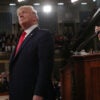Critical race theory, the enemy of free thought, undermines American exceptionalism. Many institutions have embraced teaching this ideology, blind to just how toxic it is.
As a student at the College of the Holy Cross, I know this all too well.
My college’s president, Vincent Rougeau, publicly diminished the psychological harm critical race theory poses to America’s children July 29 on “The Gloria Purvis Podcast.”
“This boogeyman that some have created around critical race theory—that it’s this mind control mechanism that is going to destroy our children and make them all feel terrible about being white—is nonsense,” he said.
Rougeau then flat-out denied K-12 students are learning critical race theory in public schools. He said it is only a tool used in law schools and legal education, and is therefore not taught to children, especially as some kind of “mind control mechanism.”
This is at best a ruse. While the texts of critical race theory may not be assigned to third graders, its tenets are being applied at all levels and the teachers are being trained according to its precepts. In other words, critical race theory is taking America’s K-12 public schools by storm and poses a grave threat to children.
Today, Marxist leaders call for the country to rid itself of capitalism and openly express their disdain for the power of the free market. In the classroom, critical race theory manifests itself by stating “systemic racism” exists. It also teaches students that some people have “privilege” due to race and others don’t.
Professors are assigning Ibram X. Kendi’s book “How to Be an Antiracist.” This book promotes the 1619 Project and tells children that “all white people play a part in perpetuating systemic racism.”
I have seen professors teach critical race theory ideas in the classroom at the College of the Holy Cross. I do not have a huge problem with it because at the collegiate level, I can pinpoint its faults and voice my opinions in the classroom. I hope my classmates will challenge the logic of this ideology as well.
But having my college’s president promote an ideology antithetical to American principles and then deny people’s concerns about it promotes critical race theory’s Marxist doctrine. But if you asked Rougeau, linking critical race theory to Marxist thought “is an attempt to deflect because people are worried about the consequences of having the conversation [about race].”
I had hoped for more from the representer of the institution I attend.
His views paint the College of the Holy Cross as a pro-critical race theory institution. This should not be the case. If Rougeau wants to encourage the free flow of ideas, he should not blatantly put College of the Holy Cross on one side of the debate.
While I may be a bit less excited about returning to campus this fall, at least I am fired up. I am ready to discuss, debate, and deliberate my professors and my peers. I’m ready to explain how this ideology is indoctrinating America’s youth. My peers and I can start fighting this now.
Critical race theory isn’t a “boogeyman,” but it is scary. Let’s work to keep it out of our schools.
Have an opinion about this article? To sound off, please email [email protected] and we’ll consider publishing your edited remarks in our regular “We Hear You” feature. Remember to include the URL or headline of the article plus your name and town and/or state.































